The Hotelier’s Guide To Mobile SEO
by travelboom
Did you know that over HALF of search inquiries are performed via a mobile device?
I am sorry to inform you that if you were not aware of this prior to today, you have been out of the loop for over two years now. We crossed what has since been dubbed “The Mobile Tipping Point” in 2015 when Google announced that there were more searches being performed on a mobile device than via a desktop device.
_________________________________________________________________________________________________________________
How Many Searches Are Being Performed Via Mobile Devices?
Search Engine Land has posted two articles in the past two years roughly defining the number of searches Google performs annually. In 2015, they claimed Google was performing at least 1 trillion searches per year. In 2016, they claimed that Google was performing at least 2 trillion searches per year.
Doing a little simple math, if Google is performing at least 2 trillion searches per year and at least 50% of search traffic is performed via a mobile device, we can safely assume that at least 1 trillion searches per year are performed via a mobile device. And, as of 2015, Search Engine Land reported that almost 60% of searches are now coming from mobile devices and that number is only expected to continue to increase, especially given the recent adoption and growth of voice search, which is another blog post entirely.
Fun Fact: You can see exactly how many Google searches are being performed on any given day and in real time via Internet Live Stats.
_________________________________________________________________________________________________________________
Breaking Down The Mobile SERP
In order to understand what mobile search results look like and how they differ from desktop results, let’s first take a quick look at two desktop search results.
The first search result is for a more broad query “hotels in seattle washington”:
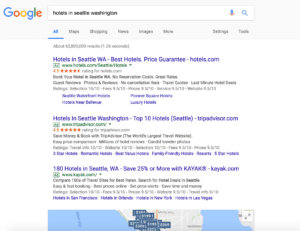

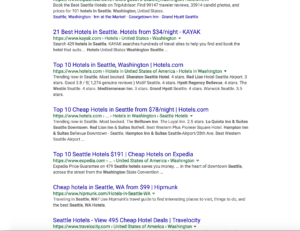
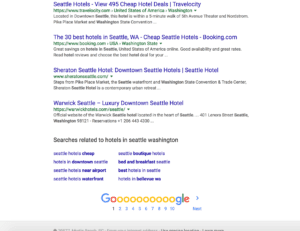
This particular SERP structure is standard for what we’ve seen recently for similar broad queries. The entire first half of the page is dominated by three to four paid ads, followed by an interactive map with several Google Hotel Ads listings. Then, well below the fold, the organic search listing begin.
The structure is similar, though slightly different, for branded search queries, as we can see for “kimpton hotel seattle”:
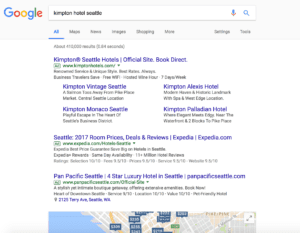
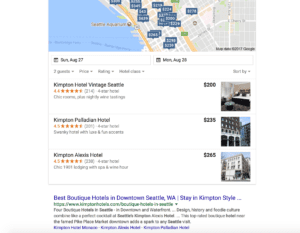


In this case, only three paid ads are showing (though it is still very possible for four to appear), followed by the organic search results and a Google local box along the right-hand side of the page, which presents the Google Hotel Ads information.
If you thought the organic results being below the fold on desktop was bad, wait until you see the mobile results. Though “the fold” is not nearly as big of a deal as it used to be from a usability perspective (people are used to and normally anticipate scrolling down a page), there are far more distractions that people will see before they get to organic search results, particularly on a mobile phone.
The same broad search (hotels in seattle washington) looks like this on a mobile phone (iPhone):
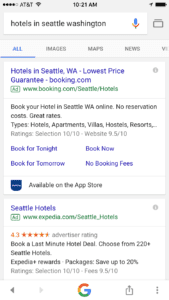
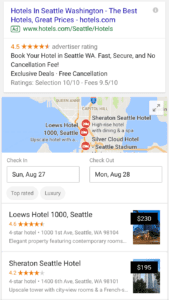
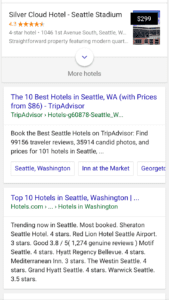
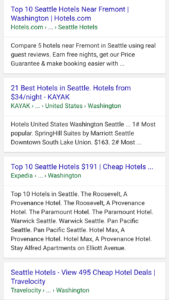
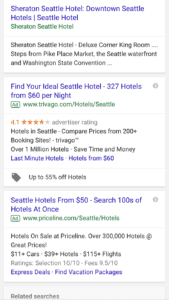
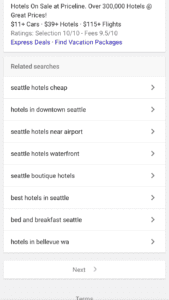
As you can see, it took me seven full scrolls to get to the bottom of the same search results page, which is a lot of scrolling for one person to do. And forget actually going to another page; if someone does not find exactly what they are looking for within this first page of results, they are simply going to refine their query and perform another search.
The branded search results page is equally as hefty (kimpton hotel seattle):
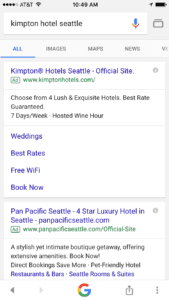
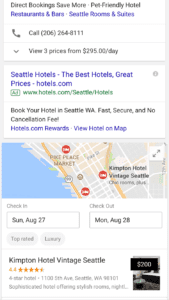
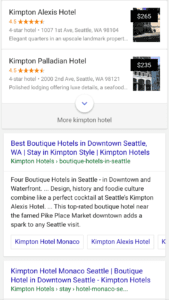

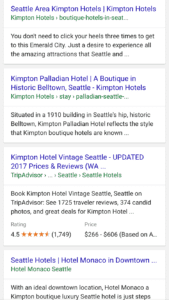
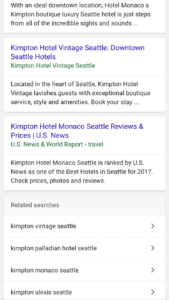
Similar to the brand desktop search results, there are three paid ads followed by a snazzy local search box with an interactive map, several buttons (click to call, directions, website, “more” prompt which takes users to a page with Google Hotel Ads results – among other info), and then finally the organic search results.
It is important to note that, from a usability perspective – scrolling aside, the mobile SERPs are incredibly user-friendly and interactive. The map interface allows a user to easily navigate to different areas of the location and even zoom in and out fairly easily. Mobile also features the popular “click to call” button, an underappreciated convenience when you consider that one would actually have to pick up the phone and dial a number if they performed a search on desktop.
________________________________________________________________________________________
Mobile SEO Tactics For Hotels
1.) Have A Mobile Friendly Website
Yes, believe it or not, there are still thousands and millions of websites that are not mobile friendly. Though there might be a few, and only a few, reasons why one would not want to have a mobile friendly website, this certainly does not apply to the travel industry. Travelers are on the go and often plan their trips across multiple devices. Having a mobile friendly website experience is an absolute must not only from a ranking and search engine performance perspective but also from a general usability perspective. That’s why a mobile friendly website should be at the top of your list for your hotel SEO strategy.
Google rolled out a “mobile friendly” algorithm update in Spring 2017. This update essentially placed a higher weight on mobile friendly sites over non-mobile friendly sites on the mobile SERPs. Therefore, if your website is not mobile friendly, you could experience a drop in your mobile specific rank.
There are three types of “mobile friendly” websites:
-
Responsive Web Design
- URL structure remains consistent
- HTML remains consistent
-
Dynamic Serving
- URL structure remains consistent
- HTML does NOT remain consistent
-
Mobile Specific
- URL structure does NOT remain consistent
- HTML does NOT remain consistent
Typically, responsive web design is the preferred method of providing the best mobile friendly experience possible, though there are cases in which a dynamic serving or mobile specific website are more appropriate. (Ex: Facebook has a mobile specific website, not a responsive website. However, 90+% of their mobile traffic is via their mobile app.)
This rule of thumb also applies to hotels. Your hotel should be using a responsive website for a consistent and optimized experience across all devices. For anyone unfamiliar, “responsive” simply means you only have one website that automatically adjusts to proper proportions across any device, providing a seamless user experience.
One of the few caveats to using a responsive website, however, is that website speed can become an issue if your website is not properly set up. Issues that could slow down your site include heavy code, using flash, large images and videos, etc.
Website speed is an important ranking factor, particularly for mobile, so you want your hotel website to be as fast as possible. Be sure that your website code is as efficient as possible and that all videos and images are scaled down as much as possible without sacrificing quality, of course.
Mobile pop-ups are also a big no-no when it comes to Google mobile rankings. The search giant rolled out yet another mobile specific algorithm update that penalized websites that had intrusive mobile pop-ups. Gone are the days of full-screen sized email captures. Rather, your hotel website should present a minimal banner sized pop-up for mobile visitors, if anything.
2.) Optimize Title Tags & Meta Descriptions
Title tag and meta descriptions are one of the trickier points to mobile SEO. Obviously, mobile SERPs present much less room than a traditional desktop SERP when it comes to room to sell yourself. Though Google used to simply cut off descriptions that were too long and simply add an unattractive ellipse, that is not always the case. In 2016, Google extended the amount of characters that can display on mobile SERPs to ~78 characters, which is actually longer than what we typically see on desktop (~70 characters). Now, rather than the title tag only taking up a single line, the title tags can take up to two lines on mobile search results. It is important to note, however, that Google does not always use your pre-set meta information and now all search results will have the two lines to work with, as seen below.
Assuming Google cooperates and includes your prefered title tags and meta descriptions, your task as a marketer is to craft meta information that will be attractive, concise, and meaningful across all devices. Given the nature of a responsive website, having mobile specific meta information is not possible, so your message needs to resonate with searchers whether they are on desktop, a tablet, or a mobile device.
How can you do this?
First, do a few searches for your target queries and scope out the competitive landscape. See what other top ranking sites are using for their meta information and then do it better.
Then, use descriptive, action-packed words to create your titles and descriptions. You can even experiment with a little marketing psychology to persuade users to click. Thought your meta information is not a ranking factor, user behavior is. When people click on your link for a search result, it sends a positive signal to search engines that their results matched the query. And, other page-usage stats like bounce rate and time on site also factor into how well or not well Google’s result met the searcher’s intent. Your goal as a marketer should be to match your pages with search queries, craft high-quality, persuasive meta information to entice searchers to click, and then optimize your pages to provide the information and experience that users are seeking.
Tips for hotels:
Use keywords where it makes sense
Please note: where it makes sense. Do not sacrifice the quality of your tags and descriptions to simply cram in keywords. Strategically place keywords in a natural manner for target pages. And remember, always write your meta information for humans, not algorithms.
Bad: Seattle Hotels | Hotel In Downtown Seattle | Kimpton Hotel Seattle
Good: Welcome To Kimpton, A Premier Downtown Seattle Hotel
Be descriptive
Use colorful imagery and powerful action words to entice users to click.
Bad: Seattle Hotel Waterpark | Seattle Hotel With Waterpark
Good: Experience The Kimpton Waterpark, Seattle’s #1 Hotel Waterpark
Use psychology
This works particularly well for key conversion pages, like a specials or deals page. Examples include conveying exclusivity, showing social proof, or even fear tactics like scarcity can be highly effective in nudging people through the conversion process, which, in this case, would simply be to click on your link.
Bad: Seattle Hotel Deals at Kimpton Hotel – Seattle Hotel Specials
Good: Seattle Hotel Deals at Kimpton – Book These Specials While They Last!
Use numbers
Numbers are easy to absorb and quickly convey what the page information includes. These work particularly well on mobile when people are quickly scrolling through options. And, this could be a great way to showcase particularly enticing rates or deals.
Bad: Hotel Rooms In Seattle | Kimpton Hotel Seattle Guest Rooms
Good: 10 Cozy Hotel Room Layouts At Kimpton Seattle – Find Your Perfect Room
3.) Use Structured Data
Though search engine area great at a lot of things, they are not quite sophisticated enough to extract the meaning of a lot of what the internet has to say. Meaning, it might know that a “resort” and a “hotel” are similar queries, but it does not actually know what a hotel or a resort is. Structured data is a specific vocabulary that expressed through html tags placed throughout web pages. This vocabulary provides clues to search engines about the meaning of particular items on a page. In addition to providing search engines more information about the content of your website, structured data can also drastically change your information appear vastly more appealing on search engine results. Are you familiar with seeing restaurant menus presented on search results? What about review stars? Or those convenient answer boxes? These are all achieved through marking up data across websites.
Schema.org Markups For Hotels
- Geo Position
- Telephone
- Star Rating
- Photos
- Logo
- Map
- Hours
- Aggregate Rating
- Number of Rooms
- Hotel Features & Services
- See full list of hotel specific recommendations
For more information, check out Google’s Introduction to Structured Data and Moz’s guide to Schema.org.
For help, see the Structured Data Markup Helper and the Structured Data Testing Tool.
4.) Optimize For Local Search
Having an up-to-date Google My Business page is an absolute must and if you have not claimed your business page, please stop what you are doing right now and do so at google.com/business.
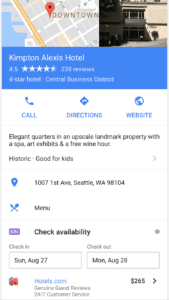
This page is not incredibly helpful in conveying important information about your property to guests but is also a primary piece of the SERP puzzle, particularly for brand related search results. Your page can show up in a local “three pack” for non-brand relater search queries or will display prominently for searches directly related to your brand. This page provides a wealth of information for searchers, including standard business info like your address and contact information, user reviews, property images, and, more recently, Google Posts. The local page also serves Google Hotel Ads, an advertising platform that pulls hotel rates from various sources, which we dig into in the next section.
5.) Experiment With Google Hotel Ads
A newer addition to the Google advertising product lineup, Google Hotel Ads have come a long way in the past few years. The platform works by pulling rates directly from your hotel’s booking engine and displaying them on the hotel SERP. Participants have a few options from a bidding perspective (CPC or commission based) and Google has evolved over time with the integration of some pretty sophisticated automation, which makes it a bit easier to take “set it and forget it” approach versus more hands on advertising like AdWords. Of course, you will want to monitor your campaigns and make adjustments where necessary, but overall the GHA platform has become very user-friendly and Google is doing a much better job of optimizing for performance compared to when the platform first rolled out. The key to understanding why you should be bidding for placement here can easily be seen by performing any hotel search. Unfortunately, OTAs are heavily present in this space and are probably already bidding for placement here. This is another block and tackle approach to maintain your direct bookings and reduce your reliance on these sneaky partners.
The key to understanding why you should be bidding for placement here can easily be seen by performing any hotel search. Unfortunately, OTAs are heavily present in this space and are probably already bidding for placement here. This is another block and tackle approach to maintain your direct bookings and reduce your reliance on these sneaky partners. However, maintaining appealing rates and rate parity is paramount for performance. What’s the point of showing prices if you are feeding the OTAs lower rates than what shows on your hotel website?
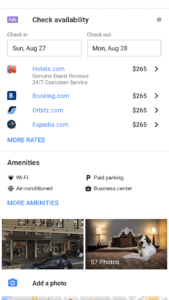 The platform functions very differently than an AdWords campaign in that you have very little control over where your rates appear. You cannot see any keyword related data or bid for placement on specific keywords. Google has focused on providing the best user-experience possible and therefore shows your property and rates where they deem most relevant. Luckily, they seem to be doing a fairly good job at this and returns more than justify running ads.
The platform functions very differently than an AdWords campaign in that you have very little control over where your rates appear. You cannot see any keyword related data or bid for placement on specific keywords. Google has focused on providing the best user-experience possible and therefore shows your property and rates where they deem most relevant. Luckily, they seem to be doing a fairly good job at this and returns more than justify running ads.
_________________________________________________________________________________________________________________
Other Ways To Dominate The Mobile Search Results
Of course, there are other ways to compete in the crowded hotel space that will complement your SEO efforts. Advertising platforms, like AdWords, offer options to bid competitively for mobile placement. Additionally, claiming and optimizing your Google My Business page can make your hotel stand out with accurate, up to date information and high-quality reviews.
Learn more about dominating mobile SERPs with the TravelBoom Hotel Marketing Podcast!
__________________________________________________________________________________________________________________
Other Hotel SEO Resources
Want to know more? Check out some of our other free SEO resources below!
- Podcast: How To Hire An SEO Consultant For Your Hotel
- Podcast: Linkbuilding For Hotels
- Podcast: On-Page SEO Cheat Sheet For Hotels
- Podcast: Should My Hotel Have A Blog?
- Podcast: Top 3 SEO Ranking Factors For Hotels
- Blog: How To Create Kickass Content For Your Hotel Website
- Blog: SEO Website Audit For Hotels
- Blog: Keyword Research For Hotels
And, don’t forget, you can always drop us a line if you have a specific question or want a free website evaluation.